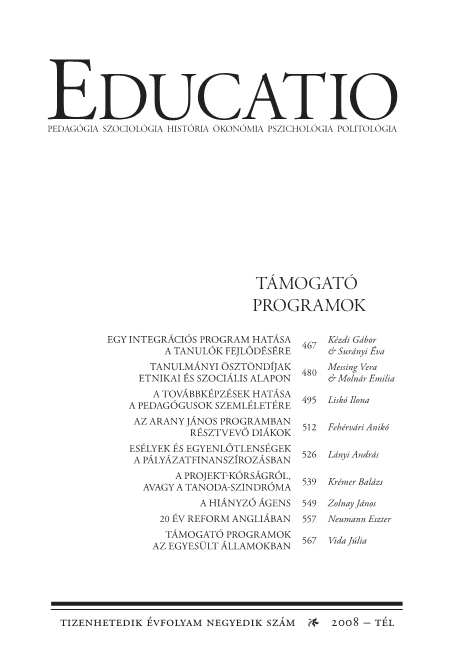Egy Integrációs Program hatása a tanulók fejlődésére
The Impact of a School Integration Program for Disadvantaged Children on the Students’ Development
Author(s): Éva Surányi, Gábor KézdiSubject(s): School education, Educational Psychology, Social differentiation, Inclusive Education / Inclusion, Sociology of Education
Published by: Akadémiai Kiadó
Keywords: School Integration Program; Hungary; primary school; disadvantaged students; Roma students;
Summary/Abstract: Gábor Kézdi and Éva Surányi [The Impact of a School Integration Program for Disadvantaged Childrenonthe Students’ Development] present results from the evaluation of a program of the National Network of Integrated Education (Országos Oktatási Integrációs Hálózat – OOIH) of Hungary. Since 2003, the program has promoted integrated education of Romani and disadvantaged students in Hungarian primary schools (grades 1 through 8), and it has provided comprehensive educational and financial support for the 45 participant schools. The authors assessed the effect of the program on the development of the students by means of comparison to a matching control group of schools. The dimensions analyzed were literacy, secondary school enrollment, and noncognitive skills such as locus of control (one’s belief in controlling one’s own destiny), self-esteem, and coping with difficult situations. The authors explored overall program effects as well as specific outcomes for Roma and non-Roma, disadvantaged and non-disadvantaged groups of students. The results showed small but significant positive effects in virtually all dimensions and for all groups of students. Due to the non-experimental nature of the analysis, the causality of the program effects cannot be claimed as certain. However, econometric evidence supports the causal interpretation, and it is clear that program schools achieved a greater success with children of similar background than non-program schools. Our findings demonstrate that it is possible to provide integrated education in Hungarian primary schools in a way that benefits minority and majority students alike. Modern educational methodology as well as better incentives for schoolteachers can explain the success.
Journal: Educatio
- Issue Year: 17/2008
- Issue No: 4
- Page Range: 467-479
- Page Count: 13
- Language: Hungarian

